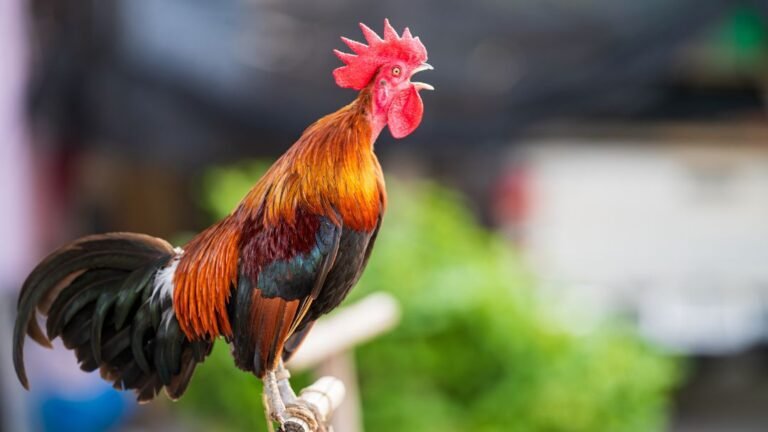Ivermectin is a medication that can effectively treat worms, lice, and mites in chickens. We will discuss the correct dosage and usage instructions for using Ivermectin on chickens.
When dealing with parasites such as worms, lice, and mites in chickens, it is crucial to find the right treatment. Ivermectin, a potent medication, can effectively eliminate these pests and ensure the well-being of your chickens. However, it is essential to understand the correct dosage and usage instructions to ensure its efficacy and safety.
In this comprehensive guide, we will provide you with all the necessary information to properly administer Ivermectin to your chickens and alleviate any concerns regarding worms, lice, and mites.
Understanding The Importance Of Ivermectin For Chicken Health
Understanding the Importance of Ivermectin for Chicken HealthIn order to maintain a healthy and productive flock of chickens, it is crucial to be aware of the common parasites that can affect them. These parasites, such as worms, lice, and mites, can wreak havoc on the overall well-being of your chickens, leading to poor egg production, decreased weight gain, and ultimately a decline in their overall health. Fortunately, with the use of Ivermectin, a powerful anti-parasitic medication, you can effectively combat these pesky parasites and ensure the optimal health and productivity of your chickens.Overview Of Common Parasites Affecting Chickens
Chickens are susceptible to a range of parasites, some of the most common being worms, lice, and mites. Let’s take a closer look at each of these parasites:- Worms: Intestinal worms, such as roundworms and tapeworms, are prevalent among chickens. These parasites can cause a variety of health issues, including poor digestion, weight loss, and anemia.
- Lice: Lice are external parasites that live on the surface of the chicken’s feathers. They can cause irritation, feather damage, and lead to the spread of diseases.
- Mites: Mites are tiny arachnids that infest the skin of chickens and can cause intense itching, feather loss, and even skin infections if left untreated.
The Impact Of Parasites On Chicken Health And Productivity
Parasites not only affect the overall health of chickens but also have a significant impact on their productivity. When infested with worms, chickens may experience malnutrition and a decrease in egg-laying capabilities. In severe cases, parasite infestations can even lead to death. Lice and mites, on the other hand, can cause stress and discomfort to the chickens, leading to reduced feed intake, decreased weight gain, and ultimately lower egg production.Using Ivermectin To Combat Parasites
Ivermectin is a highly effective anti-parasitic medication that can be used to target and eliminate worms, lice, and mites in chickens. This medication works by paralyzing the parasite’s nervous system, effectively killing them and preventing further infestations. When administered correctly and at the recommended dosage, Ivermectin can help improve the overall health and productivity of your chickens.Dosage And Administration
It is important to carefully follow the instructions provided with the specific Ivermectin product you are using. The dosage of Ivermectin for chickens varies depending on the weight and age of the birds, as well as the type of parasite being targeted. It is recommended to consult with a poultry veterinarian or follow the manufacturer’s guidelines to determine the appropriate dosage for your flock.In conclusion, understanding the importance of Ivermectin for chicken health is crucial for maintaining a productive and disease-free flock. By being proactive in controlling parasites such as worms, lice, and mites with Ivermectin, you can ensure the well-being and productivity of your chickens. Remember to always consult with a professional or follow the manufacturer’s guidelines when using any medication for your flock’s health and safety.Effective Dosage And Administration Of Ivermectin For Chickens
Ivermectin is a highly effective and widely used antiparasitic medication that can help keep your chickens healthy and free from worms, lice, and mites. However, it’s crucial to administer the correct dosage and follow the proper administration methods to ensure optimal results. In this article, we will discuss how to determine the appropriate dosage based on the weight of the chicken, the different administration methods for Ivermectin, and the recommended dosage frequency and duration for achieving the best outcomes for your flock.
Determining The Appropriate Dosage Based On The Weight Of The Chicken
When it comes to administering Ivermectin to your chickens, it’s essential to calculate the appropriate dosage based on the weight of each bird. This ensures that each chicken receives the right amount of medication to effectively combat parasites without risking overdose or underdose.
Here’s a simple formula you can use to determine the correct dosage:
| Chicken Weight (in pounds) | Ivermectin Dosage (in milligrams) |
|---|---|
| Under 1 pound | 0.05 mg |
| 1-5 pounds | 0.08 mg |
| 5-10 pounds | 0.17 mg |
| Above 10 pounds | 0.25 mg |
Using this table, you can easily determine the appropriate dosage for your chickens by simply knowing their weights. However, remember to consult with a veterinarian or a poultry expert to ensure accuracy and avoid any potential complications.
Different Administration Methods For Ivermectin
Fortunately, there are various administration methods you can choose from when it comes to administering Ivermectin to your chickens. The choice of method depends on your comfort level and the feasibility of each approach.
Here are some common administration methods for Ivermectin:
- Oral Suspension: This method involves mixing a specific amount of Ivermectin with water or feed and allowing the chickens to consume it. It is a simple and effective way to administer the medication without causing much stress to the birds.
- Topical Application: Applying a small amount of Ivermectin directly to the bird’s skin, particularly along the neck or back, is another popular administration method. This method is suitable for birds that may be difficult to handle or for those that don’t readily consume water or feed with the medication.
Remember to carefully read and follow the instructions provided with the specific Ivermectin product you are using, as the administration methods may vary slightly depending on the brand or formulation.
Dosage Frequency And Duration For Optimal Results
The frequency and duration of Ivermectin dosage depend on the particular parasites you are targeting and the severity of the infestation. Generally, it is recommended to administer Ivermectin once, followed by a second dose given 7-10 days later to effectively break the parasite’s life cycle.
However, it’s crucial to consult with a veterinarian or poultry expert to receive personalized advice based on your flock’s specific needs and local environmental conditions. They can provide guidance on the ideal dosage frequency and duration to achieve optimal results while minimizing the risk of developing resistance in parasites.
By determining the appropriate dosage based on the weight of your chickens, choosing the right administration method, and following the recommended dosage frequency and duration, you can ensure that Ivermectin effectively eliminates worms, lice, and mites from your flock, helping to keep them healthy and thriving.
Treating Worm Infestations In Chickens With Ivermectin
When it comes to keeping your chickens healthy, one of the most crucial aspects is ensuring they are free from worm infestations. Worms can wreak havoc on your flock’s health, causing illnesses and even death if left untreated. Fortunately, there is an effective solution available: Ivermectin. In this article, we will explore how Ivermectin can be used to treat worm infestations in chickens, including the common types of worms found in chickens, the signs and symptoms of infestations, and how Ivermectin effectively eradicates worms in these feathered friends.
Common Types Of Worms Found In Chickens
In order to effectively treat worm infestations in chickens, it is important to understand the common types of worms that can affect them. The most common types of worms found in chickens include:
- Roundworms (Ascaridia galli): These are the most common and can cause poor growth, weight loss, decreased egg production, and can even lead to death in severe infestations.
- Cecal worms (Heterakis gallinarum): These worms primarily reside in the ceca, a part of the chicken’s digestive system. They can cause diarrhea, weight loss, and in severe cases, can lead to egg peritonitis.
- Capillary worms (Capillaria spp.): These worms infest the chicken’s digestive tract and can cause weight loss, anemia, and poor overall health.
- Gape worms (Syngamus trachea): These worms primarily affect the respiratory system of chickens, causing difficulty in breathing, coughing, and even respiratory distress.
Signs And Symptoms Of Worm Infestations In Chickens
Identifying the signs and symptoms of worm infestations in chickens is crucial for early detection and treatment. Some common signs and symptoms to watch out for include:
- Decreased appetite: Infested chickens may show a reduced interest in food.
- Weight loss: Worm-infested chickens may experience unexplained weight loss.
- Poor feather quality: Affected chickens may have rough, dull, or ragged feathers.
- Diarrhea: Worms can cause loose stools or diarrhea in chickens.
- Reduced egg production: Worm infestations can lead to a decrease in the number of eggs laid by chickens.
How Ivermectin Effectively Eradicates Worms In Chickens
Ivermectin is a highly effective deworming agent that can be used to eradicate worm infestations in chickens. It works by paralyzing and killing the worms, effectively preventing their further reproduction and spread. Usually available as a liquid or injectable form, Ivermectin can be administered orally or through injection, depending on the severity of the infestation.
The dosage of Ivermectin for chickens will vary depending on the weight of the birds and the specific type of worm infestation. It is important to follow the instructions provided by the manufacturer or consult with a veterinarian to ensure the correct dosage is administered.
Administering Ivermectin to chickens is a simple process that can be done by carefully measuring the appropriate dose and administering it directly into the chicken’s beak or through injection. Regular follow-ups and repeat dosages may be necessary, especially in the case of severe infestations or recurring issues.
Remember, prevention is key to maintaining a healthy flock. Regularly deworming your chickens with Ivermectin and maintaining good hygiene practices can help minimize the risk of worm infestations and keep your feathered friends happy and thriving.
Eradicating Lice And Mites In Chickens With Ivermectin
Lice and mites infestations can be a real nuisance for chickens. Not only do these pesky parasites cause discomfort and stress to the birds, but they can also have a negative impact on their overall health and productivity. Thankfully, with the help of Ivermectin, a highly effective antiparasitic medication, you can eradicate lice and mites in chickens and ensure their well-being. In this article, we will explore the common types of lice and mites that affect chickens, how to identify infestations, and the role of Ivermectin in eliminating these parasites.
Common Types Of Lice And Mites Affecting Chickens
Before we dive into the details of combating lice and mites in chickens, it’s important to understand the common types of parasites that can infest these birds. Here are a few examples:
| Type | Description |
|---|---|
| Chicken Body Lice | These lice feed on the feathers and skin of chickens and can cause severe itching and irritation. |
| Chicken Head Lice | Head lice prefer to reside in the feathers around the head and neck region, leading to feather damage and discomfort. |
| Chicken Feather Mites | Feather mites infest the feathers and can cause feather loss, irritation, and even affect the bird’s ability to fly. |
These are just a few examples, as there are various species of lice and mites that can affect chickens. It’s important to stay vigilant and take prompt action if you notice any signs of infestation.
Identifying Lice And Mite Infestations In Chickens
Early detection of lice and mite infestations is key to effectively eradicating them. Here are some signs that may indicate your chickens are dealing with these parasites:
- Visible presence of small insects or mites on the bird’s feathers, especially around the vent, head, and neck areas.
- Feather loss, bald patches, or damaged feathers.
- Intense itching, scratching, and restlessness observed in the affected chickens.
- Pale combs and wattles due to blood loss caused by lice infestations.
- Decreased egg production or poor growth rates in younger chickens.
If you notice any of these signs, it’s crucial to take immediate action to prevent the infestation from spreading further and causing additional harm to your flock.
The Role Of Ivermectin In Eliminating Lice And Mites In Chickens
Luckily, Ivermectin provides an effective solution for eradicating lice and mites in chickens. This antiparasitic medication works by interfering with the nervous system of the parasites, leading to their paralysis and eventual death. Ivermectin is available in different formulations, including injectable, oral, and topical solutions, offering flexibility in choosing the most suitable administration method for your flock.
Before proceeding with Ivermectin treatment, it’s important to consult with a veterinarian or poultry specialist to determine the appropriate dosage for your chickens. The dosage will depend on factors such as the weight of the birds, the severity of the infestation, and the product’s concentration. It’s crucial to follow the recommended dosage instructions carefully to prevent under or over-dosing.
Additionally, it’s important to note that Ivermectin has a relatively short duration of action. Therefore, multiple treatments may be necessary to completely eliminate lice and mites from your chicken’s environment. Remember to repeat the treatment as advised by the veterinarian and thoroughly clean and sanitize the coop and surrounding areas to prevent re-infestation.
By using Ivermectin as a part of your chicken’s parasite control program, you can effectively eradicate lice and mites, ensuring the well-being and productivity of your flock. Regular monitoring and preventive measures, such as maintaining good hygiene and implementing biosecurity practices, should also be followed to minimize the risk of future infestations.
Safety Considerations And Precautions When Using Ivermectin For Chickens
When it comes to keeping your chickens healthy and free from parasites, Ivermectin is a popular and effective choice. This broad-spectrum antiparasitic medication is commonly used to treat a variety of external and internal parasites, including worms, lice, and mites in chickens. However, as with any medication, it is essential to follow safety considerations and precautions to ensure the well-being of your flock and to minimize any potential risk.
Potential Side Effects Of Ivermectin On Chickens
While Ivermectin is generally safe and well-tolerated by chickens when used correctly, it is crucial to be aware of potential side effects. Some chickens may experience mild adverse reactions, including temporary lethargy, loss of appetite, or diarrhea, which usually resolve without intervention. However, in rare cases, chickens may experience more severe reactions, such as tremors, incoordination, or even respiratory distress.
To minimize the risk of adverse reactions, it is crucial to follow the recommended dosage guidelines for Ivermectin. Overdosing can increase the likelihood of side effects, so it is vital to measure and administer the correct amount of medication based on your chickens’ weight. Consult with a veterinarian or experienced poultry keeper for proper dosage instructions tailored to your specific flock.
Ensuring Proper Dosage And Application To Avoid Adverse Effects
Proper dosage and application of Ivermectin are crucial to ensuring its effectiveness in treating parasites while minimizing the risk of adverse effects. Here’s how to ensure safe administration:
- Weigh your chickens individually or estimate their weight based on common breed averages.
- Select the appropriate Ivermectin formulation, whether it is a liquid, powder, or injectable, following the label instructions.
- Calculate the correct dosage based on the recommended dosage per kilogram or pound of body weight.
- Administer the medication according to the specific instructions provided, whether it is through oral administration, topical application, or injection. Take care to avoid contamination of food or water sources during administration.
- Monitor your chickens closely after administration for any signs of adverse effects, and seek veterinary assistance if needed.
Alternative Options And Natural Remedies For Parasite Control
If you prefer a more natural approach to parasite control or if you want to explore alternative options, several methods can complement or replace the use of Ivermectin:
- Regular cleaning and sanitizing of the coop and nesting areas to reduce parasite populations.
- Introducing diatomaceous earth to the environment, which can help control external parasites like mites and lice.
- Herbal or essential oil-based solutions, such as neem oil or garlic, which are believed to have natural insecticidal properties.
- Implementing rotational grazing or pasture management practices to minimize exposure to parasites.
- Providing a well-balanced diet supplemented with natural immune boosters to enhance your chickens’ resistance to parasites.
Remember, while alternative options can be effective for some flocks, it is essential to monitor your chickens for any signs of parasitic infestation and consult with a veterinarian for professional advice and guidance tailored to your specific situation.
Conclusion
To keep your chickens healthy and free from worms, lice, and mites, Ivermectin is an effective solution. With the right dosage and proper administration, you can ensure the well-being of your poultry. Regular treatment is crucial to prevent these pests from spreading and causing harm.
By incorporating Ivermectin into your chicken health routine, you’ll protect your flock and promote their overall welfare. Happy chickens lead to a thriving and productive farm.




